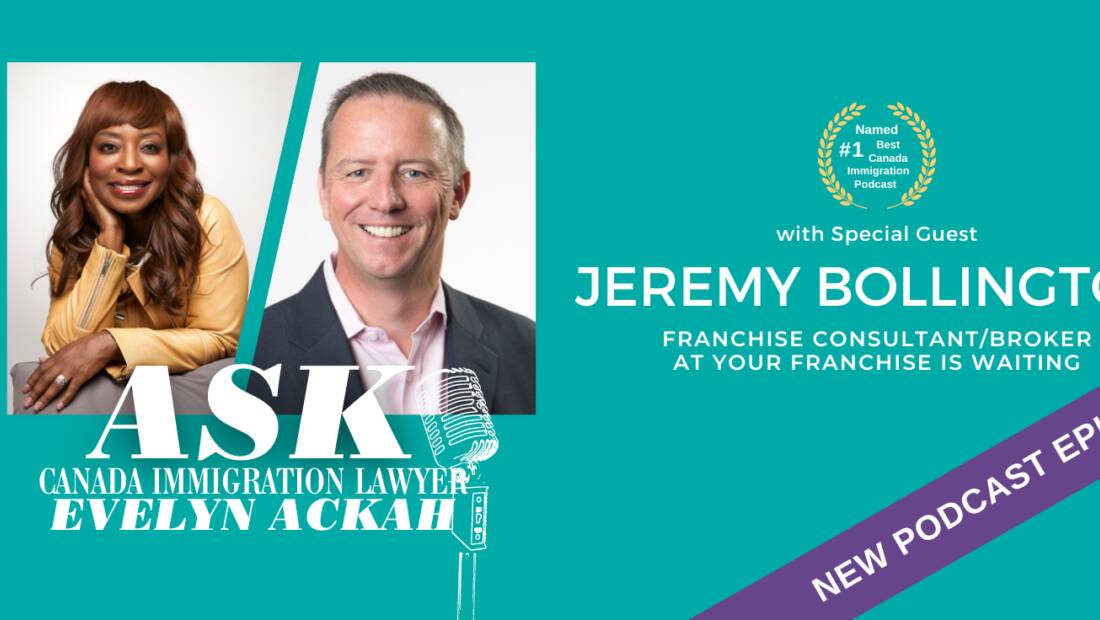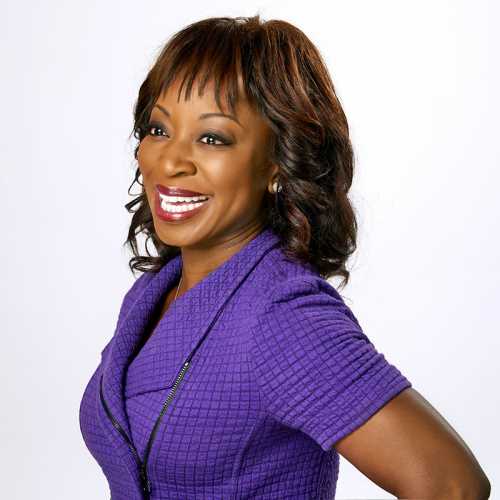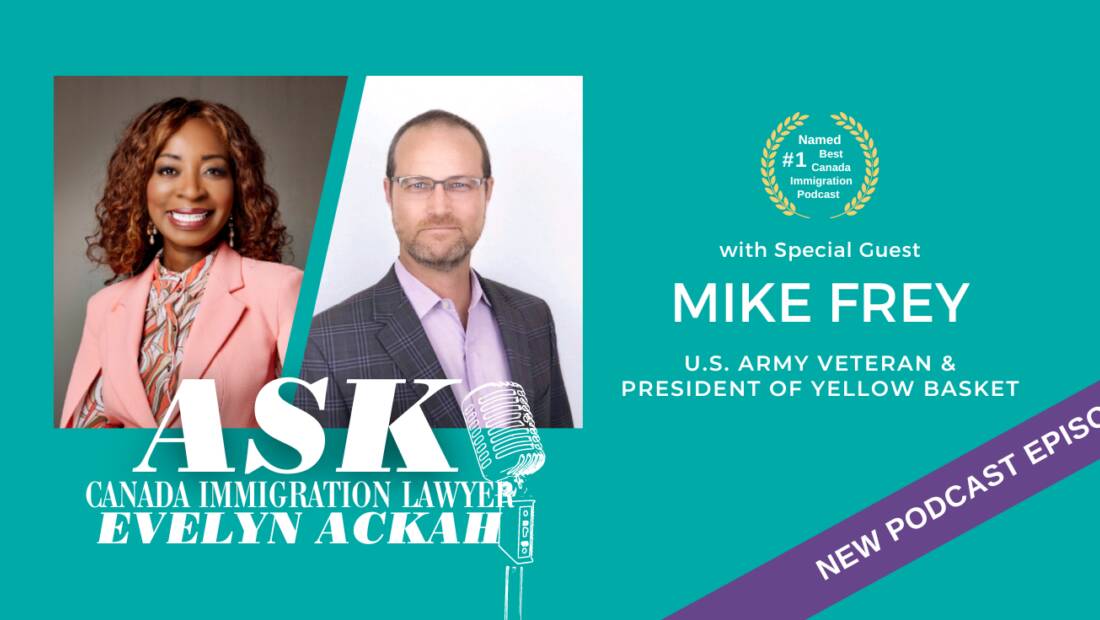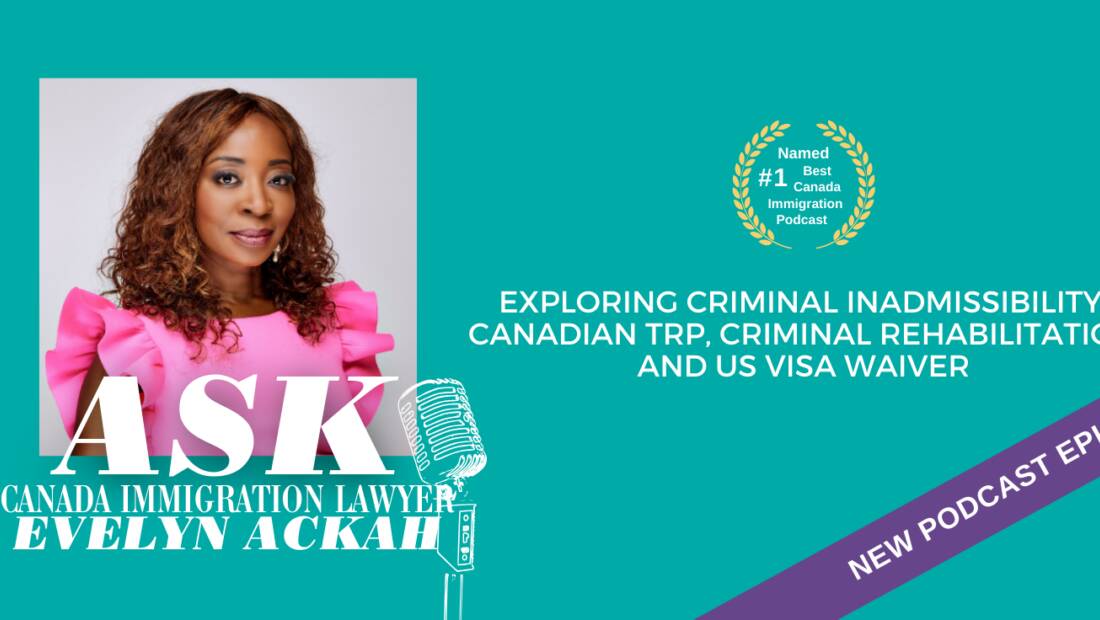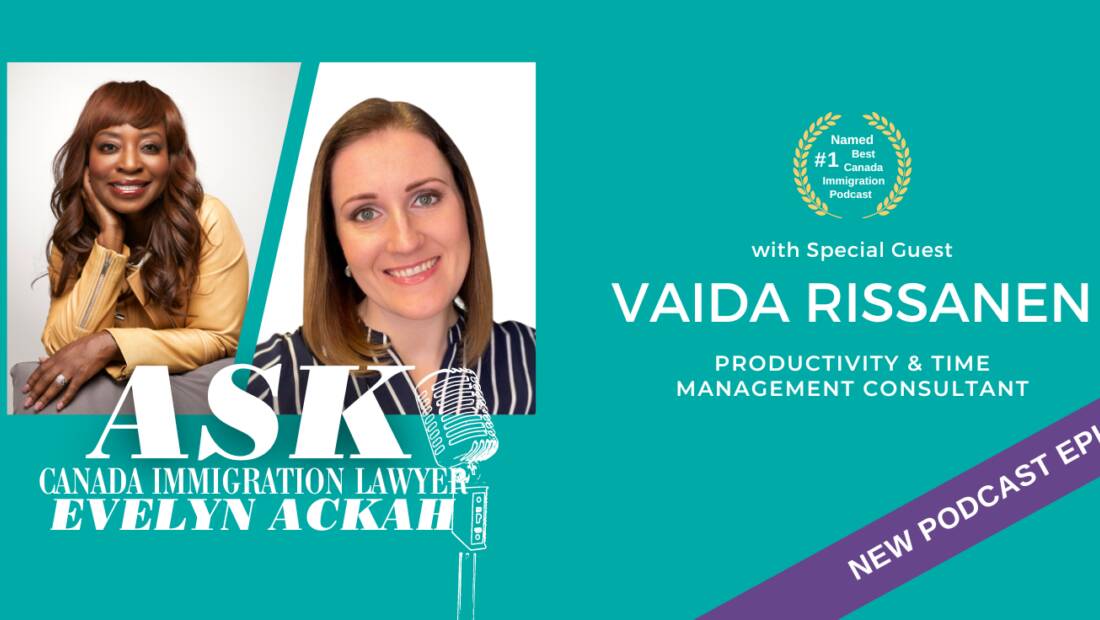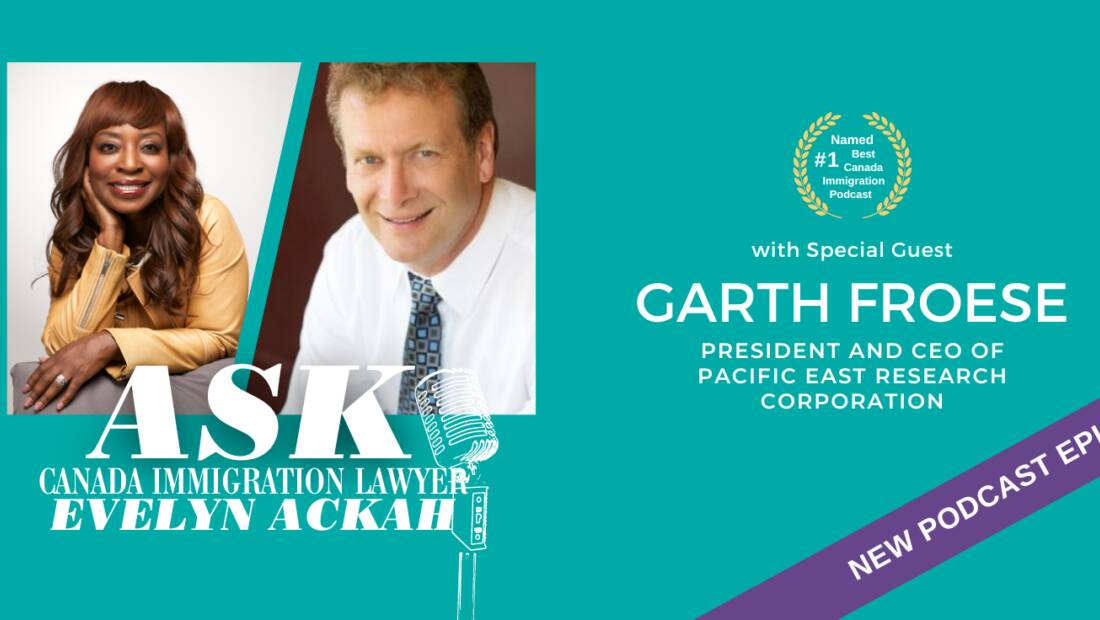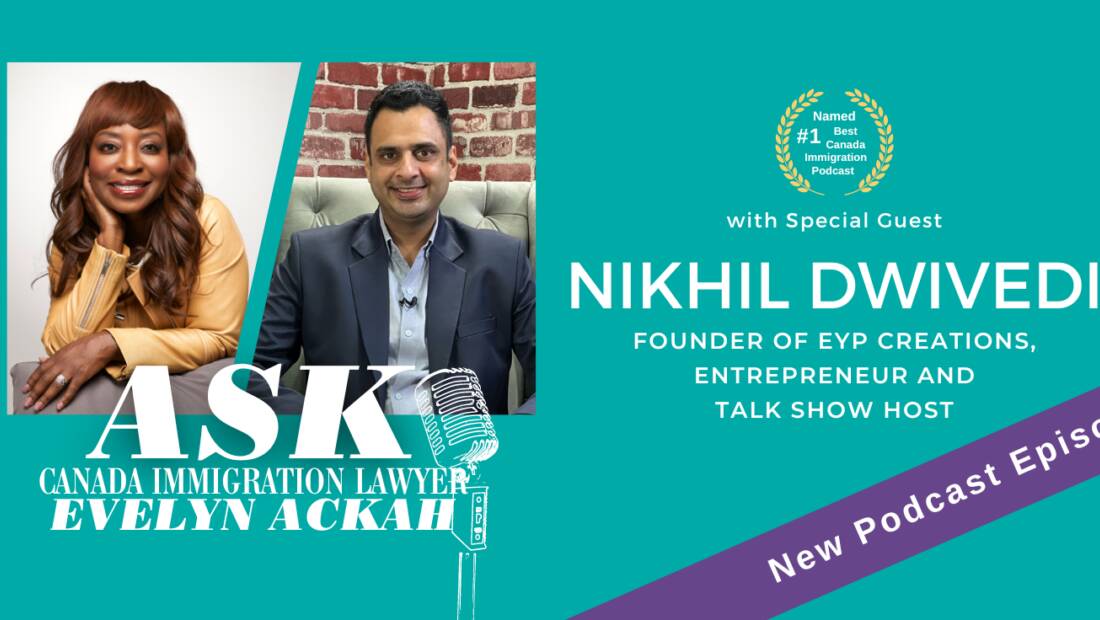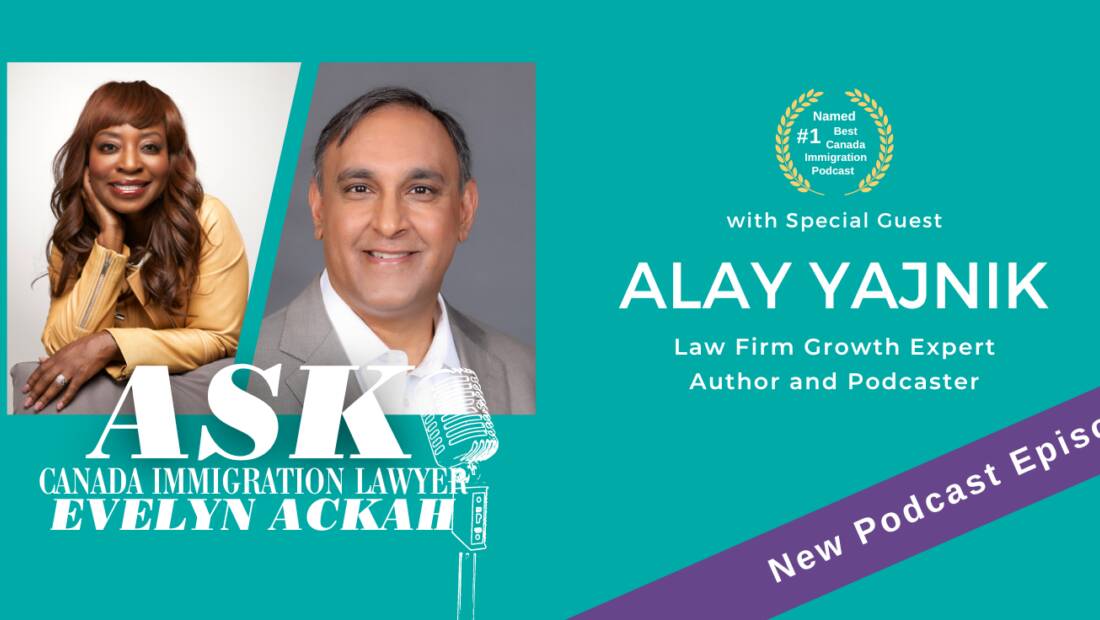Or listen on your favourite podcast app
On the Ask Canada Immigration Lawyer Evelyn Ackah podcast, host Evelyn Ackah talks with Jeremy Bollington, the president of Your Franchise Is Waiting about his business and how he helps entrepreneurs and business owners looking to move to the US with a franchise business entity. Bollington shares his background, which includes working in the banking world in London and New York before moving to Charleston, South Carolina and investing in franchise businesses. He explains that he got into franchise business consulting after getting laid off and partnering with an existing consultant. Bollington focuses on helping people find the right franchise to support their E-2 visa application, and he discusses the investment requirements and the process of applying for the E-2 visa. He also talks about the types of businesses that don't require a physical storefront and the trends he has observed in the franchise industry.
Jeremy Bollington can be reached through LinkedIn or his website:
LinkedIn
Your Franchise Is Waiting
BOOK YOUR FREE CASE EVALUATION
Here are the key takeaways from Evelyn Ackah's podcast interview with Jeremy Bollington.
Jeremy assists entrepreneurs and business owners moving to the US with franchise business entities.
- Jeremy's Background:
- Jeremy is originally from the UK and moved to New York in 1997 with a banking career.
- He transitioned into franchise business consulting after being laid off in 2015.
- Invested in beauty brands and transitioned into helping others with franchise sales and support.
- Franchise Business Consulting:
- Jeremy helps clients, particularly those without business formation experience, find suitable franchises.
- Focuses on E-2 visa candidates, helping them navigate investment requirements and business operations in the US.
- Challenges and Considerations:
- Discusses the importance of having sufficient funds not just for the franchise but also for personal living expenses.
- Highlights the significance of understanding credit history challenges when moving to a new country.
- E-2 Visa Process:
- Explains the timing and process for E-2 visa applications in relation to franchise investments.
- Advises clients on making necessary investments and preparing for visa interviews while undergoing franchise training.
- Types of Franchises:
- Mentions various service-oriented franchises that do not require a storefront, such as in-home senior care, irrigation, window treatments, and estate sale businesses.
- These options often have lower initial investments compared to storefront franchises.
- Market Trends and Client Origins:
- Noted a trend of clients from Germany and other parts of Europe, in addition to Canada, seeking opportunities in the US.
- Motivations include economic frustrations in home countries and the appeal of US market opportunities.
- Support for Existing Franchisees:
- Jeremy primarily works with new franchise arrangements but also supports existing franchisees in some cases.
About Evelyn Ackah
Evelyn Ackah is the Founder and Managing Lawyer at Ackah Business Immigration Law. With offices in Calgary, Toronto and Vancouver, we work with individuals and business owners from all over the world who want to cross borders seamlessly. For more information on immigration to Canada or the United States, Ask Evelyn Ackah at Ackah Business Immigration Law today at (587) 854‑3821 or email Evelyn directly at contact@ackahlaw.com.
The Ask Canada Immigration Lawyer Evelyn Ackah podcast, hosted by Calgary Immigration Lawyer Evelyn Ackah, was named the #1 Best Canada Immigration Podcast in 2023 by Feedspot.
BOOK YOUR FREE CASE EVALUATION
Transcript
Evelyn Ackah:
Good day everyone. This is Evelyn Ackah from the Ask Canada Immigration law firm podcast. I'm so excited today to have our guest on, our special guest today is Jeremy Bollington and he is the president of Your Franchise is Waiting and we connected on LinkedIn and now I'm excited that he's joining us today to talk about his business and how he can work with entrepreneurs and business owners looking to move to the US with a franchise business entity. Welcome Jeremy.
Jeremy Bollington:
Thanks Evelyn. It's great to actually see you more in person I guess, through Zoom. So happy to be here and look forward to a good conversation.
Evelyn Ackah:
I'm looking forward to it too. I'm really interested by your background. So as we were just talking before we started, you've got a really interesting background that led you into this. Could you tell us a little bit about where you come from, how you got into this franchise business consulting and then we can get more into the nitty-gritty of how you can help our listeners and our clients?
Jeremy Bollington:
Yeah, I'm happy to. So I'm based out of Charleston, South Carolina, but as you can probably tell by my accent, not originally from here.
Evelyn Ackah:
Really? You're not?
Jeremy Bollington:
No. Although I'm working on my y'alls and other South Carolina accent pieces. So I grew up in the UK, went through school there and got into the banking world, worked in London, met my wife. We had a couple of very young kids and the opportunity to work in New York for what was supposed to be three years back in 1997. Came around and we jumped at it and I guess what? 27 years later we're still here.
Evelyn Ackah:
Wow.
Jeremy Bollington:
So I was in the banking world in New York. We lived in New Jersey, raised our kids there and got laid off in 2015 and it was a tipping point in many ways because our youngest had just left to go to college and I was done with being on a plane two, three times a week and jet-lagged and all of that. And long story short, we moved to Charleston, South Carolina and looked for business opportunities. Ended up going through a franchise search pretty much what I now help people do. Invested in two different, of all things, beauty brands, one of which we still have, which is a waxing business, so hair removal and that runs pretty much on its own. I've got good managers in place and just keep an eye on it from afar and out. And I got into-
Evelyn Ackah:
How did you get into doing your own enterprise, your own franchise into becoming the franchise support and consultant. And how did that happen?
Jeremy Bollington:
Yeah. I guess we started the franchise business in... Well we opened locations in early 2017, we're building them up. One of those businesses, actually the one that we sold a while back, I was also helping them grow. So I was involved with franchise sales, recruitment of franchisees and then helping those franchisees find locations and coaching them through build out and opening and ongoing support. So I had window into the franchise sales side, which is obviously completely different to being a franchisee and an owner. And that area intrigued me coming in I guess by about late 2019, I was starting to think about what else can I add to my business? Then COVID hit and salon businesses here were not closed anywhere near as long as Canada and actually one of the second business I had was a blow dry bar business, which was headquartered out of Toronto.
So we saw firsthand the pain that those owners in Canada had when they were shut for a long period of time. But we were closed for two, three months and it gave me that kick to, okay, let's think about what else to add to the business. And so I ended up partnering with an existing consultant that I'd gotten to know who'd brought me some good candidates and partnered with her and went through the training and everything else to start.
And initially, was focused on people that had done what I'd done, which was coming out of corporate looking for that second act if you will. And then stumbled I think, as we were talking about, I stumbled into the E-2 and immigration world because I had through a referral source, somebody introduced me to a guy in Germany, worked with him, he's now been in the US through and is on an E-2 visa with his wife and kids in Dallas. Yeah, found him a business. We went through the full process, looking at the investment amount and everything. So he's been in the US now over two years. I think he was telling me the other day that he issued something like 110 W-2s, those are employee tax forms at the end of last year. Is building a big business.
Evelyn Ackah:
Wow. That's great.
Jeremy Bollington:
So that got me intrigued by having come to the US, albeit under different guise. I came on a work visa, then the bank asked me to stay, they sponsored green card, we got green cards. My wife and I now have citizenship. We finally bit the bullet on that a couple of years ago, but it got me interested in having seen... I love the U.S. I think it's a phenomenal country and I can see, every time I talk to somebody that's made that decision that they want to come here, the finding the business is one of the biggest challenging parts for them because... Particularly, if they don't have business formation experience, shall we say.
Evelyn Ackah:
Yeah.
Jeremy Bollington:
Now I focus most of my efforts around working with people that are looking to find that franchise to support that E-2.
Evelyn Ackah:
That is so cool. Well, from an immigration perspective, we do get people calling or emailing and reaching out saying, "I want to get to the States," from all over the world, not just Canadians to the US and they're looking for ways and obviously, our job is to figure out what are the options. So you can have family sponsorship and you can go to school and if there's nothing else, then obviously, they always look at the E-1, E-2 options for them. And I guess my challenge right now with the E-2 is the consular processing is very long. They're so backlogged, at least in Canada right now, it's taking something like six or eight months at least to get an appointment, stuff like that. But let's say you find that ideal client that is interested in E-2 and we're able to say talk to Jeremy. How do you help them? Especially let's say, they're coming from Canada and they may not have experience running a business. How do you help them in collaboration with immigration lawyers and all the tax? I'd love to see how that, it's a team effort it sounds like.
Jeremy Bollington:
Yes, very much so. And I think if I think about that team, if you will, obviously, the immigration attorney piece is critical up front, I think. If somebody comes to me directly and has not spoken with an attorney, that's really got to be the first conversation. But I think what I tend to focus on, and I think as we talked about, before hitting record on the call, one of the things with franchises, they don't work for everybody because you are joining a system. It varies by system, but there are guardrails and things that you've got to follow the system. So for somebody that's got that business ownership experience, whether that's starting their own business or buying, let's call it an independent business, at some point in, let's say in Canada, they may feel frustrated by the franchise structure. And so often, I see people like that are much better served to either again, buy an existing business for sale or start maybe it's a very similar business to where they have experience in their home country.
Evelyn Ackah:
So the franchise, I know there are a lot of rules and there's a whole package. That's why it's called a franchise. So you're saying that for some people, it's not necessarily the right fit because they need to be fully comfortable with all of the systems, right?
Jeremy Bollington:
Yes, those guardrails. And again, definitely I don't want people to think that it's rigid and you can't do anything without calling the franchise. But there are definitely guardrails and the rigidity of those rails depend on system to system. Some are much more flexible, but I think where a franchise can be a great option, particularly thinking about E-2 and that somebody's moving to a new country, yes, maybe Canada and the US, not too dissimilar, but still, some differences and even depending on which state somebody is moving to.
But if somebody's coming to new culture, new country and they don't have that prior experience, but maybe they've had a series of corporate roles, it can be a great option because, and again, we take people through a due diligence process both upfront to try to identify the right types of businesses, the right franchises that can depend on the role of the owner in a given business. And then they will go through a due diligence period with the franchises that we introduce them to. But if they've gone through that process and gotten comfortable with the franchise, it certainly should reduce the risk. I always say to people, there's no guarantee of success, and this is not an E-2 comment, it's a general comment. People fail in franchises here in the States because either they don't follow the system or they don't have the skill set to run a business.
Evelyn Ackah:
Run a business. Yeah. And you find that a lot. When you become a leader or an owner, you've got to rise up and elevate your game because we don't all have that naturally. And so, even if you've got an interest in owning, I think it's very much about they have to be willing to develop as well. To develop themselves into the leadership that their business needs to be successful. What about locations, Jeremy? I'm sure depending on where people are looking, there's always a different market. Do you help in terms of that kind of analysis to figure out if they're open to living... If I wanted to live in the states anywhere and I wanted a franchise, do you help with where they might want to start based on the market or is it more like they say they want to live in Texas and then they just find a place in Texas? How does that work?
Jeremy Bollington:
Yeah. So maybe we look at the two extremes there. One would be somebody coming and saying, and so often, it's either Texas or Florida. Particularly from Canada.
Evelyn Ackah:
I wonder why they're leaving the Great North.
Jeremy Bollington:
The temperature definitely has a thing to do with it. So on one extreme, if somebody's saying, "I want to be in..." let's use Dallas as an example. Or on the other end of the spectrum, somebody saying, "I don't care where I go, it's much, much more important to find the right business and then figure out where." That latter approach is I think much, much better in terms of going... Because the process at that stage that I will go through with somebody is, well, we won't even talk about geography. We'll focus entirely on the analysis and the work that we do, looking at transferable skills, prior experience, investment budget, role of the owner. Is the owner going to be a salesperson? Is the owner going to assemble a team and it's more operational focus? And a whole series of other things that we'll look at. And then as we narrow down to hopefully, four or five businesses that fit those criteria and also are willing to work with E-2 because not all, and actually a lot of franchise companies are not comfortable and we can come back to that point.
Evelyn Ackah:
Yeah, definitely want to hear that. Yeah.
Jeremy Bollington:
But what I'll do then is really try to find the right business match. The person will go through due diligence with the franchisors and let's say, they narrow it down to one business, they feel very comfortable with the franchisors, they've met and talked to a bunch of existing owners. And then part of the discussion is, of the available markets that the franchisor has, what's the best available? Or maybe by then they've narrowed it down to say, okay, maybe like Texas, Florida, South Carolina. Okay, what are the best available territories? Because depending on the nature of the business, it's either going to be, if it's a bricks and mortar business, it'll be a relatively small area to look in to find the right premises. Or if it's a territory based business, it'll be a series of zip codes. So that's-
Evelyn Ackah:
Yeah. You can only go into an area obviously after you've done all that analysis, it has to be available in terms of the franchisors' availability of options?
Jeremy Bollington:
Yeah. So the other end of that spectrum, somebody like, "I want to be in Dallas." The process there, we're still going through that matching process. But the challenge in that is I'm then looking at, okay, what is available in Dallas? And that will just by nature, will knock out some brands that might've been a great fit for the individual, but maybe don't have availability in Dallas but do in other markets. And so it's definitely more restricting if somebody comes and says, that's the market I want to be in.
Evelyn Ackah:
They want to live. Yeah, yeah. I like that idea of just being open to all areas. At the end of the day, they want to be in the US, they want to have immigration status, they want to move to green card down the line. And so I think being flexible sounds like it's very important to give them more options than less. What would you consider the average investment? Because I know franchises are so different based on all kinds of things, how they're valued. But what would you think would be the average investment that somebody who's considering this would need to have available before you would even really delve into it with them?
Jeremy Bollington:
Yeah. So I would say I tend to focus on what's required for the E-2. And as you know, it's a little gray in terms of there isn't a hard dollar minimum. What I've tended to operate with is that the investment that the individual's going to show on their E-2 visa application. So what they've physically spent before submitting the application needs to be 100,000. And I say with the caveat, that I've had a couple of clients where it's been slightly below that and they got approval. It certainly gives more options if somebody is able to invest upfront, let's say 125. And as you go up beyond that.
Evelyn Ackah:
More, yeah. The value of the franchise. So for me, I usually say when people come to us, for me, I work $150 because I want them to be very clear. It's not just the low... And because there's variation, I am always looking at, there's no... It's gray as you said. So it could be $75,000. For some people it could be $200,000. So I always say, you need to really be ready and have that availability of money to do it. Tell me about-
Jeremy Bollington:
Certainly when... Sorry, can I just add to that? I think two other things there. Some franchisors will really dig into that with clients and say... And actually, I had this happen recently where somebody was, they were having really good discussions with the franchisor, but we decided to cease discussions because we just didn't feel... And we being really, the franchisor didn't feel the candidate had enough backup beyond what he was going to invest initially. And that often with franchising in the US can be hurt with the fact that somebody's coming to the US if they don't have a credit history here, they're having to fund everything with cash. And so you need, maybe it's a business that requires two or three trucks, light trucks. The franchisor generally assumes and shows in their investment range that somebody is basically going to lease the vehicles, but if they've got to pay cash, that suddenly ups the investment amount.
I think the other thing I was going to say on that, that something we look at very carefully is how is somebody going to support themselves here? Because you've got the business which is going to suck up some cash and probably you have to assume it's going to suck up more than you think even beyond the visa application. But then you're coming, new country, maybe you don't have health coverage, particularly if your spouse, if you're coming with a spouse, isn't necessarily going to be taking advantage of that spousal visa straight away and finding a job with health coverage. So sometimes people will ask like, "Well, what should I assume for that?" And I'm like, "I can't answer that." You need to do the research and be comfortable in terms of what your living expenses are going to be, but you sure as heck need to make sure you've got funds set aside fro that.
Evelyn Ackah:
I think it's really important to me what you said about credit history. People don't think about that when they're moving. It's like you may have all the credit in the world and then you're starting over an whether you're coming to Canada or the US it's like you're starting over. I don't care if you're an executive or a student, it's like you're starting over. And so that makes it hard to get what you need financially through the banks, obviously, even a credit card for the company. Those are all things I think that are great reminders that you need that extra, extra backup and it's not like you're going to be making money right away that the business is going to support you. So I would think six months to a year of living expenses on top of it, plus the medical, like what you're saying, which is very expensive in the States.
And if you want good coverage, you need to pay for it. So I feel like those are really good tips for people to consider as opposed to just, I have enough for the business franchise and nothing else. But tell me, Jeremy, about where in the stage would you normally advise a client to start the E visa, the E-2, in terms of, do you come to terms with the franchisor? Do you sign an interest? What stage? Because sometimes, people come to me and I'm like, "I don't know what stage you're at. Are you ready for this?" Don't sign anything until you know... So it's a piece of, how do you get the E if you haven't committed something, but you also need to get the E-2 before you can start the business. So what's the timing there?
Jeremy Bollington:
Yeah. So, the way that we work, and we've had successful approvals doing this, obviously, is that... And let me give you one caveat. Most of the businesses that I focus on are not for three, twos, are not businesses that need a physical bricks and mortar location. And by that, I mean, a storefront, maybe they might need a small office space or storage space or something like that.
Evelyn Ackah:
Interesting.
Jeremy Bollington:
And the reason behind that is because, to answer your question about how far along in the process does somebody have to get? If it's bricks and mortar, so let's say it's a salon just for argument's sake. The advice that I've received from pretty much every attorney I've spoken to is that they can't submit the E-2 until that salon space is almost ready to open. Ideally, it's open, but at the very least, there needs to be a lease in place and construction built. It has to at least be underway. The challenge with that is that not only is the person paying, they're paying the franchise fee, they're becoming a franchisee in the system. They're going through training, they're negotiating the lease, but at that point, they're on the hook for the lease because the landlord is not going to do a contingent lease. They've spent money on the build out and then they've got to wait in theory, to truly launch the business because it's going to be hard.
Yes, they could come in on a tourist visa to check on the building, but that gets a little difficult. And so they've put all that investment in and really with no contingency. And so that's I think why bricks and mortar tend to be difficult. And just a much higher investment range as well because a typical salon business is going to be $250, $300, $350-400 to open and to build. So what I tend to focus on more particularly, I would say, most people come with a more limited budget would be service-related businesses.
And to answer the question of when do you apply for the E-2? So typically they would pay the franchise fee, so their buy-in to the system. They would potentially acquire whatever equipment. I'm trying to think, let's say a window cleaning business, power washing business. If you look at what are the things that they have to acquire as part of the franchise setup there, aside from the franchise fee, they will typically pay marketing fees for usually through the franchise or to run, let's say Google Ads, Facebook ads, things like that to promote the business. It's possible to prepay some of that with most systems. So typically, they'll prepay fees, so that counts towards the E-2 investment. They'll typically try to purchase a truck. That can be challenging in terms of, I'm coming from Europe, how do I get a truck? Often, the franchisor will work with them to help them on that. And then any equipment that's large-scale equipment so that they're able to show that they've made that investment.
Evelyn Ackah:
That investment.
Jeremy Bollington:
Some franchisors, not all, will agree to the franchise fee being held in escrow so that if they're not approved, they can potentially get some or maybe all of that refunded. The challenge with that, and I often say to people, the franchisor isn't going to start their training program for you if that's in escrow because they're opening the kimono at that point, giving you their trade secrets and things. And so I think in many cases, it's better that they launch into that training, which they can often do while they're waiting for that visa interview. So the visa application typically with a franchise will go in once somebody has paid that franchise fee, acquired the initial equipment or at least paid for it and then hopefully they can start.
A lot of the training is going to be online and remote and then be ready to launch the business formally once they're approved. And the benefit of that, I'd say, the last thing I'd say is that training piece, if somebody's gone through that or at least started the training, when they get to that interview stage, if there are very specific questions about the business, they should be in a much better position at that point with that knowledge base to really talk about the business and how it's being launched and marketed and things like that.
Evelyn Ackah:
That's a good point. Yeah. It's just so interesting because yeah, people come to me and I'm like, "I don't understand." Obviously I'm learning about the franchise business that you know about, but if they don't get the visa, I'm assuming they get nothing back. Is that how it works?
Jeremy Bollington:
Well, I think depending on whether they had that escrow arrangement or... So if somebody is declined, what are their options at that point? If they've bought equipment, maybe they've paid the vendor but it's not been delivered, is there a way then to work with the franchisor to essentially return that or to sell it on to the next new franchisee that's opening somewhere? I think there are ways to recover that. If they've gone through the training and paid the franchise fee, they're probably not getting the franchise fee back at that point.
Evelyn Ackah:
Oh, that's so interesting. Are you seeing certain trends? It's interesting for me when you're talking, Jeremy, about the different types of businesses, because of course, when I think of a franchise, I'm thinking of fast food. I'm thinking of just the places that we're used to thinking of as a franchise. And for me, it's usually fast food or restaurants, but maybe service, a blowout place, a brow place, a wax place. But those are storefronts. What other kinds of businesses that you would say would not require storefronts besides window cleaning? What other opportunities are out there? Because I can't really think of one.
Jeremy Bollington:
No, and it's a great question. And it's also I think, one of the biggest things I try to address and deal with, because I think most people's view of franchising, it was certainly mine when I first got into the business, was that the brands and the storefronts that you see... It's funny now, knowing the broader sway of franchises, now I am driving around and you see the vans for the HVAC companies or the plumbing companies, things like that. And you go, yep, they're all here in town with the franchise operations. So probably, the best way is to just talk about some of the E-2 approvals and what businesses, I've worked with people. So my guy in Dallas that I mentioned, he did an in-home senior care business. So hiring caregivers to go into homes to look after generally elderly or people needing support in homes, a real HR business because you build over time a big staff of caregivers in that business. But relatively-
Evelyn Ackah:
No, that's interesting because yeah, there is no need necessarily for storefront on something like that. It's a lot of staffing, right? It's a staffing-
Jeremy Bollington:
Yeah. Typically, you'd have an office, small office space for that. Let me think of others. So an irrigation business, so a services business providing sprinkler systems to both businesses and consumers, pretty low cost because it's limited equipment. Start out with a van, couple of employees and then build as the business builds. Things like window treatments. Actually behind me, my plantation blinds, things like that. Shutters, blinds, curtains. There are a couple of good franchises at relatively low cost there. For that business, you've got to be more comfortable going into people's homes, comfortable with consultative sales type approach to things. Had somebody do an estate sale, house clearance business, there were a couple of franchises in that.
Evelyn Ackah:
Yeah, yeah, yeah. Which is really valuable service if you're dealing with that when somebody has passed on or moved out. It's a lot of work. That's really interesting.
Jeremy Bollington:
It is. And definitely one of those where you've got to be comfortable networking in the community with that business because it's building relationships with realtors, attorneys, just a broad swath of people.
Evelyn Ackah:
For the referral opportunities. Are there other countries, certain countries you're seeing a trend where you're seeing more people coming to you from in the last couple years?
Jeremy Bollington:
I'd say aside from Canada, I know we were talking about it before in terms of motivation for warmer climate and that. I'd say the other big one for me has been Germany and other parts of Europe, but mainly, Germany.
Evelyn Ackah:
Interesting.
Jeremy Bollington:
That's one of the largest number. It's certainly Germany in terms of Europe is... I think last year there was something like 3000, 4,000 E-2s approved for coming out of Germany.
Evelyn Ackah:
Germany. Interesting.
Jeremy Bollington:
And similar themes. People maybe they've been to the US two or three times, just like the culture and the climate and feel a little frustrated at the moment from an economic perspective in Germany.
Evelyn Ackah:
Yeah, everybody's looking for that better opportunity. And obviously, the US being such a large market, people are really thinking about where they can go and land. Do you help, Jeremy, with people who already have franchises? Like for instance, putting a new franchise potential client into an existing? Do you help with that too, or only if it's a brand new franchise arrangement?
Jeremy Bollington:
I would say the vast majority of what I do is where it's new and I would say in a limited number of cases, franchisors might market through the franchise broker, franchise consultant networks where there is a resale opportunity. And so I do have access to those, but it's definitely nowhere near as broad as you would see from let's say, business broker or BizBuySell, if somebody's looking for whether it's franchise or non-franchised business.
I think the challenge there I see is often it's... And I think there are some markets where there are business brokers that will focus on helping buyers, almost like a buyer's agent in real estate, navigate the landscape. And so Florida is one where there's a co-broking structure in Florida that somebody can act for the buyer and get paid a commission. In most states, that isn't the case. And so in most cases, business brokers are not really motivated to help somebody navigate that unless they see them as an absolute buyer for one of their businesses-
Evelyn Ackah:
Yeah. That they're ready to go.
Jeremy Bollington:
...That trying to sell. And then you've always got to worry about conflict of interest there. So I do think that looking for a business to buy, and that's often where people will come to me because they've just gotten frustrated looking on BizBuySell. Half the things on there are not real, and they just keep going down rabbit holes trying to find a business.
Evelyn Ackah:
And they're looking for something they can trust. And I think the fact that you've done this twice and you've also come from a business background, but that you've done this, you know what the experience of being a franchisee looks like and you've been successful in that, I think that helps because if it was me, I'd want somebody who'd done it. Because you understand the inner workings. How do people reach you to work with you, Jeremy, in terms of how they can start that conversation with you, with your franchises waiting?
Jeremy Bollington:
Yeah. I'd say two ways. If you're on LinkedIn, I think I'm the only Jeremy Bollington on LinkedIn. So feel free to connect with me there or message me. And then separately, our website, yourfranchiseiswaiting.com. We've got a separate, special E-2 section in that website.
Evelyn Ackah:
Perfect.
Jeremy Bollington:
And you'll also see links to my calendar, and you can go on and book a time for a consultation call there.
Evelyn Ackah:
That's perfect. And so, just before we wrap up, are you seeing certain trends? Are you seeing certain things changing in terms of what people are looking to franchise into in the States that's new for the next little while? I don't know. I'm wondering about that.
Jeremy Bollington:
Yeah. It's interesting. I've definitely seen it in the, it's almost coming on 10 years now or eight years, nine years that I've been involved in franchising in one form or another. If I go back to the pre-COVID time, I would say fitness was probably the hottest category. And by that in particular, I mean boutique fitness. So every small like sub-segment and niche, cycling, rowing, running, there was a whole series of things. I think that space has definitely slowed down. I worry that, to be honest, that there's too many boutique formats that if we do actually eventually get that recession, that could be challenging.
I think what's grown strongest [inaudible 00:36:56], obviously it's a very broad segment, but what really grew coming out of COVID was that home services type, across a broad sway because people were spending more time at home and noticing that I really do need to get that room painted or things like that. And so that's been a big growth area. And then I think the other trend that's been consolidation of franchise groups, be that through private equity, buying a number of brands and putting, maybe it's a holding company that then acts as the franchise or across multiple different segments or just the growth of some large franchisors, particularly in the home services that have everything from cleaning windows, lawn care, and typically, they're bringing that franchise or expertise to those sub-segments.
Evelyn Ackah:
Wow. Okay. Well, I definitely feel like the impact of COVID has been felt by everybody. And even as I said, the delays in getting your appointments for the E-2s, at least in Canada, are extensive because they're still cleaning up from COVID. But I feel like it's been interesting to look at what markets have arisen that may not have been so successful. Just like in any business, we've had to pivot and find ways to do things differently. So I'm really excited to see what the next year or two unfolds, because more and more people, I think, are looking to the US and are looking for business opportunities if they don't have other visa opportunities. And so, I'm hoping your business just continues to grow and grow, Jeremy. I had like to thank you so much for joining me on my podcast and for anybody who's listening, who'd love to learn more, we'll make sure we include Jeremy's information in our podcast, in the links as well, to his LinkedIn and his website. And I'd like to thank you so much for joining my podcast. Thanks, Jeremy.
Jeremy Bollington:
Have always been pleasure. Thank you.
Evelyn Ackah:
You're a great guest and really interesting background and business model. I'm very interested by that. So if anybody needs more information, you know where to find Jeremy. Thank you so much.
Jeremy Bollington:
Thanks so much. Bye-bye.

